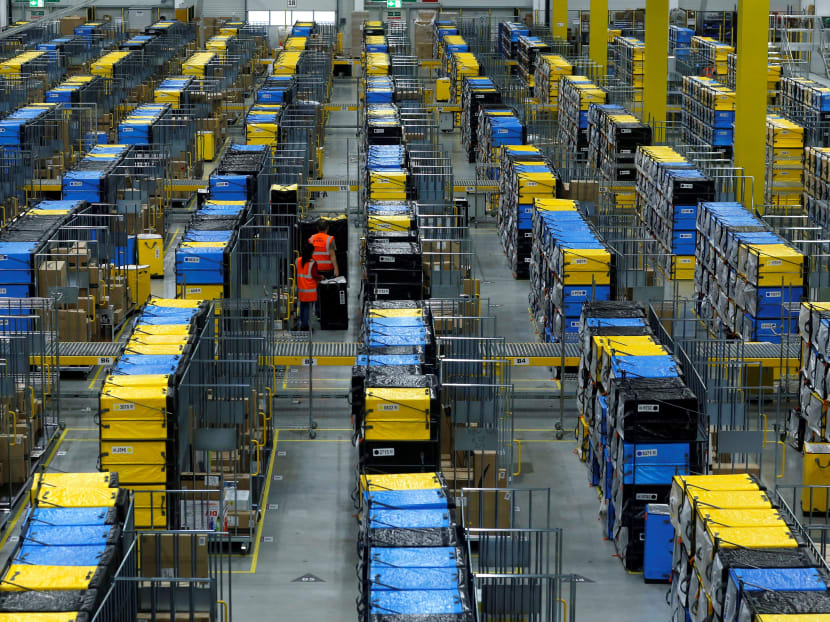Over 2,100 job, training opportunities in logistics industry, mostly non-PMET roles: MOM
SINGAPORE — More than 2,100 jobs, traineeships, attachments and training courses were available in the logistics industry at the end of September, the Ministry of Manpower (MOM) said on Tuesday (Oct 27).

About 64 per cent of the job opportunities available were in non-PMET roles such as transport clerks, material handlers and freight coordinators.
- The impact on the industry has been uneven, says MOM
- WSG has been working with companies with hiring demand to take in workers from hard-hit companies
- Logistics firms are more open to taking in workers from other sectors, Manpower Minister says
SINGAPORE — More than 2,100 jobs, traineeships, attachments and training courses were available in the logistics industry at the end of September, the Ministry of Manpower (MOM) said on Tuesday (Oct 27).
About 36 per cent of them were for professionals, managers, executives and technicians (PMETs), in roles such as regional sales manager, logistics manager and e-commerce executives.
About 64 per cent of these opportunities were in non-PMET roles, such as transport clerks, material handlers and freight coordinators.
WHY IT MATTERS
Manpower Minister Josephine Teo disclosed these figures on Tuesday morning, as part of the 11th edition of MOM’s weekly job situation report, which aims to give jobseekers an overview of which sectors are still hiring during the economic downturn. She did so over a video conference after a visit to logistics firm DB Schenker’s Red Lion facility.
MOM said in a statement that due to the effects of Covid-19, the logistics industry, which is part of the larger transport and storage sector, saw a severe reduction in air freight capacity, a shortage of workers arising from border lockdowns and reduced efficiency due to safe distancing regulations.
Mrs Teo added that the effects of the pandemic on the industry were uneven, with sectors such as aviation and aerospace more severely affected, while those providing e-commerce, last-mile fulfilment services and those serving critical sectors such as healthcare seeing an increase in demand for their services.
Government agency Workforce Singapore (WSG) has since worked with logistics companies that need workers to take in manpower from companies in hard-hit sectors such as aerospace, aviation and hospitality, on a secondment basis — through the SGUnited Jobs Initiative, Mrs Teo said.
For instance, fourth-party logistics provider DB Schenker took in 21 logistics assistants and seconded workers from Razor Solutions, a subcontractor specialising in aviation ground operations.
Between April and Sept this year, close to 380 workers in hard-hit sectors were able to continue working because of such arrangements, she added.
Mrs Teo said that while many companies tend to look for people with experience in their respective industries, the logistics sector is more open and welcoming of newcomers, as their clients are from various industries as well.
“So when they hire people from many different industries, they have more points of connection with their clients, because they are more likely to be able to understand the client’s requirements and therefore, to consider how they can update their products and services in order to meet the client’s needs,” she added.
WHAT ROLES THERE WERE
In the 2,100 openings offered by the logistics industry:
There were 480 jobs for PMETs and 860 for non-PMETs
There were 380 company-hosted traineeships and attachments for PMETs and 130 for non-PMETs
There were 220 training courses for PMETs and 70 for non-PMETs
For jobseekers with little or no experience:
There were company-hosted traineeships and attachments under the SGUnited Traineeships and SGUnited Mid-Career Pathways Programmes, and training courses under the SGUnited Skills Programme
Transferable skills in the logistics sector include soft skills such as project management and communications, and technical skills such as material management and process improvement and optimisation
Skills that could be acquired in the industry included transportation hub and control centre administration and e-commerce and last-mile fulfilment
Mrs Teo added that the logistics industry has undergone a “very rapid transformation” over the past two to three decades, with the intensified use of technology.
However, the use of technology does not always mean that jobs will be made redundant, she said.
“In the case of logistics, by using more technology, the companies are able to operate more efficiently. They win more customers, and these customers can in turn be drawn to Singapore, as an efficient and effective hub,” she said.
“And so as a result of all this increased growth, and the volume of business that we handle, we may still end up having to use more people.”
HOW MUCH THE INDUSTRY PAYS
MOM gave some details on the monthly salary range for various roles within the industry.
For regional business sales managers and business development managers, the pay at the 25th percentile is S$4,000. It is S$5,000 at the 50th percentile and S$7,000 at the 75th percentile
For logistics managers, the pay at the respective percentiles are S$3,700, S$5,500 and S$7,250
For transport clerks, it is S$1,900, S$2,175 and S$2,400
For material and freight handling workers, is it S$1,600, S$2,050 and S$2,350.











